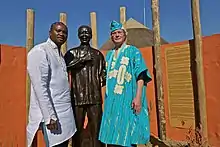Imbongi
An imbongi (plural izibongo), or a Xhosa Praise Poet, is a member of the Xhosa community who performs ceremonial activities at important events. An imbongi is traditionally a male who recites emotive poetry, sings, explains family relationships, re-tells historical events, and comments on current affairs.
History
The earliest written record of izibongo was made by Methodist missionary James Whitworth. Whitworth noted in his 6 April 1825 journal entry while visiting Gcaleka king Hintsa: ‘'At sunset, a man proclaimed aloud the transactions of the day, which seems to be the usual custom, ending with 'Our Captain is a great Captain. When the white men came to see him, he received them kindly and gave them an ox to eat.'
.png.webp)
The imbongi draws poetic inspiration from his ancestors when appropriate. When praising a chief, his poetry includes references to the praise names of the chief and the chief's ancestors. In this way the imbongi seeks to garner favor from royal ancestors for the prosperity of his nation.[1]
During the mining era in South Africa, a now discarded type of imbongi emerged. Unlike 'home' izibongo, the mine imbongi had no special social standing because their activities were largely informal and unofficial. They helped to reinforce mine rules, and generally discouraged violence, crime, and excessive materialism. Izibongo help to maintain social harmony by reinforcing accepted norms and Zulu cultural traditions.[1]
The South African government incorporated the imbongi into official national events. In 2015, 74-year-old Kgato Masemola became the first female praise singer to be given the honor of heralding the arrival of a President to Parliament. She also serves as Kgoshigadi (queen) Mogoshadi Marishane's official praise poet.[2][3]
Purpose
An imbongi is often a member of the welcoming party on royal visits, and as such, is referred to as "the poet who walks before any great chief".
An imbongi claims to be able to summon the presence of departed ancestors and facilitate communication between them and the living. It is believed that they imbue their poetry with power by invoking the names of departed ancestors. Ceremonial praises of an imbongi are used to ensure the beneficent attention of royal ancestors to the king and to his kingdom.
The Xhosa imbongi is not an entertainer, nor is he limited to just performing poetry for the royal family.[2] The imbongi is permitted to criticize communities, use suggestive language, and make outrageous statements that are normally regarded as unacceptable for the average Xhosa man.
It is considered shameful to kill an imbongi in battle, even if he actively aggravates soldiers.
Characteristics
The imbongi's performance style is generally aggressive and intimidating, and may include brandishing spears or fighting sticks and occasionally hurling them into the ground to agitate the ancestors.[2]
Imbongi performances can often be cryptic, referring to circumstances or qualities in abstracted, allusive metaphors. They are comparable to the court jester in European literature. As an important aspect of Xhosan political ritual, the imbongi on occasion deliberately bewilders his audience by making outrageous claims or using obscene language.[2] The Xhosa imbongi is often a member of the royal entourage. On significant public occasions, he recites poetry in praise of the chief, referring to the chief's lineage, qualities and actions. The imbongi may include relevant social or political commentary.
Outside of his royal duties, an imbongi performs for his community on a regular basis.[2]
Although the majority of izibongo are male, women and children may take on the role. Only men, however, dress in the traditional garments of an imbongi during ceremonial occasions.
National role
The primary consideration made when selecting a praise poet for the president's address is to rotate between languages to give each of South Africa's indigenous cultures fair representation. Parliamentary presiding officers ultimately decide who will receive the honor.[2]

See also
References
- Opland 1983, pp. 250-263.
- Opland, Jeff; McAllister, Patrick (December 2010). "The Xhosa imbongi as trickster". Journal of African Cultural Studies. 22 (2): 157–167. doi:10.1080/13696815.2010.491409.
- Mohlomi, Setumo-Thebe. "Career or calling? The changing face of praise poets". The M&G Online. Retrieved 2019-01-26.
Sources
- Opland, Jeff (1983-12-30). Xhosa Oral Poetry: Aspects of a Black South African Tadition. Cambridge University Press. ISBN 9780521241137.CS1 maint: ref=harv (link)
External links
- Xhosa Poetry
- Xhosa Culture, Imbongi - Xhosa Poet - Jongela Nojozi, retrieved 2019-01-26
- The WDB Trust, Poet Jessica Mbangeni, retrieved 2019-01-26